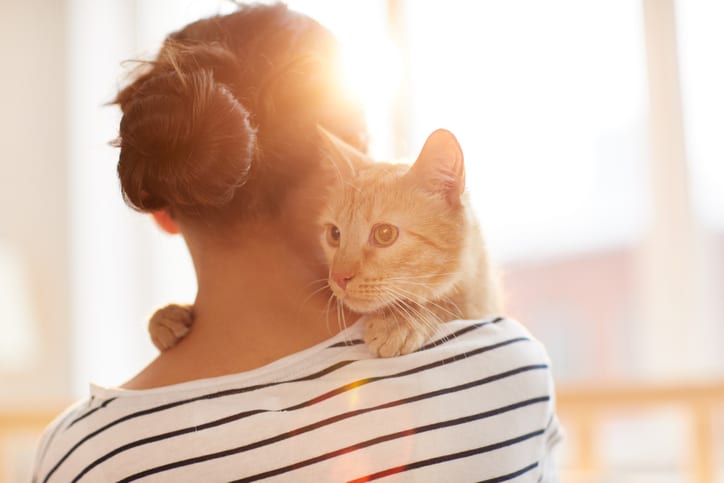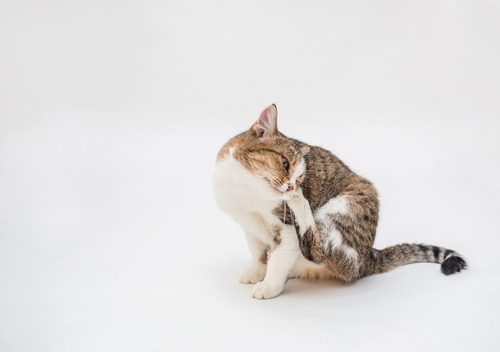Causes and Treatment of My Cat’s Coughing in Ukiah, CA
There are many reasons why your cat might be coughing. Some causes are benign and easy to treat, while others may be more complicated and serious. Here is a list of common causes of coughing in cats and how best to treat it.
Asthma
Your kitty can have asthma too. In fact, it is the leading respiratory disorder among felines. Cat asthma is caused by something irritating your cat’s airway, which causes inflammation and narrowing of the passage.
Possible Causes
- Cat litter dust
- Allergens, such as pollen or dust
- Cigarette smoke
- Heavy perfumes
- Stress
- Obesity
Symptoms
- Wheezing or audible breathing
- Open-mouthed breathing or panting
- Rapid breathing
- Coughing or hacking
- Vomiting
- Lethargy
- Stomach movement while inhaling or exhaling, as though she is forcing air in or out
Diagnosing Asthma
If you suspect your cat has asthma, you should take him to the veterinarian right away. While there, your vet will:
- Take a history of your cat’s symptoms
- Listen to his heart and breath-rate
- Imaging, such as x-ray or CT scan
- Cytology (microscopic studying of cells found in your cat’s airway)
- Bronchoscopy, where a scope is inserted in the airway to look around
How Asthma is Treated
Once a diagnosis has been reached, your vet could recommend the following:
- Corticosteroids, to reduce the inflammation in lungs and airway
- Elimination of any triggers, such as changing to a low-dust kitty litter and keeping your cat indoors
- Bronchodilators, to dilate the airway
What is the Prognosis?
With proper treatment and preventative measures, there is no reason that your kitty won’t live a long, healthy life. Cats with asthma may have occasional flare-ups, but life expectancy is usually not affected.

Upper Respiratory Infection
Otherwise known as a URI, this is essentially the kitty version of the common cold but can often require veterinary attention. Cat URIs are very contagious, so in a multiple cat home, you’ll likely see it spread among all your companions. Some URIs can even be contagious to humans or other species, so be sure to wash your hands often and quarantine any affected pets.
Possible Causes
The cause of cat upper respiratory infections are:
- Viruses, such as Feline Herpesvirus Type 1 (FVR) and Feline calicivirus (FCV)
- Bacteria, most commonly Bordetella bronchiseptica
Symptoms
- Coughing, either dry or wet
- Runny eyes and nose
- Snoring or snorting
- Sneezing
- Lethargy
- Loss of appetite
- Yellow or green mucus
Diagnosing Upper Respiratory Infections
In most cases, a URI will clear up on its own, but if your cat has been sick for longer than three weeks, or he has stopped eating and drinking, you should take him to the veterinarian, who may:
- Take a verbal history
- Listen to your cat’s chest and lungs
- Take a chest x-ray
- Collect and scan discharge from eyes or nose
How Upper Respiratory Infections are Treated
Depending on the cause of the URI, your vet may:
- Prescribe antibiotics, in case of a bacterial infection or to prevent a secondary infection
- Suggest a humidifier
- Prescribe eye ointment or nasal drops
- Recommend a follow-up visit
What is the Prognosis?
As stated before, most URIs go away on their own within one to three weeks. In the case of a bacterial infection, your cat should be feeling better after just a few days of antibiotics, but it is important to finish the entire prescription to prevent recurrence or drug-resistance. Cats with FVR or FVC are prone to develop further URI’s throughout their life, but it should not affect life expectancy with proper care.
Parasites
Heartworms, tapeworms or lungworms are common in cats and have been known to cause coughing. A parasitic infection that causes coughing is due to the parasite traveling through the blood stream and colonizing in and around the lungs. Depending on the type of parasite, and how long the cat has been infected, this could lead to serious complications.
Possible Causes
Ingestion of the following types of parasites:
- Aelurostrongylus abstrusus, or feline lungworm
- Capillaria aerophila, a bronchial nematode
- Dirofilaria immitis, otherwise known as heartworm, which is carried by mosquitos
- Dipylidium caninum, or tapeworm, which can be carried by fleas
Symptoms
- Frequent coughing fits, sometimes sounds like your cat is trying to expel a hairball
- Weight loss
- Lethargy
- Vomiting, especially if a worm is present, in the case of tapeworms, you may see segments that look like grains of rice
- Evidence of worms or tapeworm segments in feces
Diagnosing Parasites
Because a parasitic infection can go without symptoms or masquerade as other diseases, it’s good to take your cat to the veterinarian annually, especially if she is having any of the above symptoms. Your vet will:
- Examine your cat’s feces to look for worms or eggs
- Possibly run blood work
- Listen to your cat’s chest and lungs
- Take a verbal history
- Possibly do an x-ray of the chest or abdomen
How Parasites are Treated
Depending upon the severity of the parasitic infection, treatment can be relatively painless. Your vet will:
- Prescribe a de-wormer to kill the existing adult worms, and have you repeat the treatment in two or more weeks
- Suggest flea and mosquito prevention
- Prescribe anti-biotics to prevent secondary infections, such as pneumonia
- In the case of heartworms, there is no safe treatment, but your veterinarian can provide care that will help
What is the Prognosis?
In severe cases, a parasitic lung or chest infection can be deadly for your cat. With proper care and treatment, the parasites can be killed and expelled or absorbed by the body and should not affect your cat’s life expectancy.
What to Do When Your Cat is Coughing
Any abnormal coughing fits seen in your cat that have gone on for weeks or months should be addressed by your veterinarian at Mendocino Animal Hospital quickly call (707) 462-8833 or book an appointment online. The sooner a diagnosis is reached, the better the prognosis will be for your feline friend.
Recent Posts
Dog UTI Symptoms
Urinary tract infections (UTIs) can affect dogs of any age, breed, or size—and when they do, it…
Ear Mites in Cats
If your cat has been shaking their head, scratching around their ears, or showing signs of discomfort,…
Can Dogs Have Cheese?
Many pet owners enjoy sharing small bites of their favorite snacks with their dogs—especially something as tempting…
What Do Dogs Dream About?
Have you ever watched your dog sleeping—legs twitching, nose wriggling, tail flicking—and wondered what’s going on in…
Is it Normal That My Dog is Snoring?
Dogs snoring can be adorable, but it can also raise concerns for pet owners. If you’re wondering,…
About Mendocino Animal Hospital
At Mendocino Animal Hospital, we believe in fostering the human-animal bond with excellent veterinary medicine. Our full-service veterinary practice operates in Ukiah, CA with a team of skilled veterinarians and a passionate, talented support staff who make you feel like a part of the family.
As an AAHA-accredited animal hospital, every service and aspect of our practice meets AAHA’s Standards of Excellence. No matter what your pet comes in for, they’ll receive only the best in care, compassion, and service.





